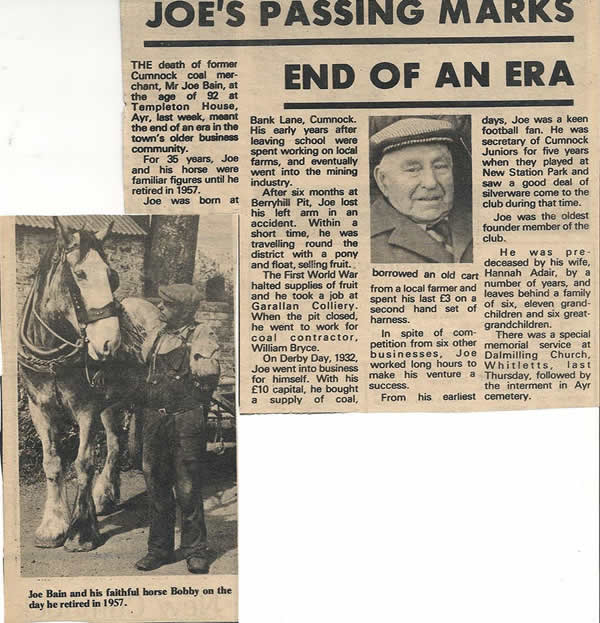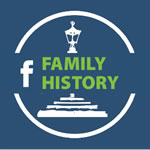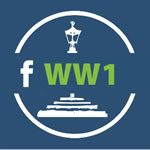Traders
Educated at Wallacehall School, Closeburn and Edinburgh University , inventor of steam navigation, was offered a living as a minister. However his love of chemistry, mechanics and mineralogy made him seek alternative employment. He was engaged as tutor to the children of Patrick Miller of Dalswinton and as a member of this household he very likely met Robert Burns – a tenant at Ellisland on the Estate.
James Taylor as described by William MacCarter in Ayrshire (1830)
Proprietor of the extensive Pottery establishment of Cumnock, James was a man of no ordinary powers and acquirements, and had it been his fortune to be placed where he might have had full scope and employment for his genius, he would long ago held a distinguished rank among the benefactors of his country. But adverse circumstances, during the greater part of his life, shed a withering influence over all his projects: chilling his ardour, discouraging his exertions and confining his usefulness within a very narrow sphere.
He was passionately fond of philosophical pursuits, particularly geology, mineralogy, chemistry and mechanics. He had paid much attention to the steam-engine, and was the first who suggested, and (in conjunction with the late Mr. Miller of Dalswinton) carried into effect, the application of that power to the propelling of vessels. The original experiment was performed on the lake at Dalswinton in the year 1788. It was completely successful…for though on a small scale, (being a four-inch cylinder) and with a vessel not calculated for rapid motion, they went at the rate of 5 miles an hour with ease. In the following year the experiment was repeated on the Forth and Clyde canal and, as it was on a larger scale, the motion was proportionally accelerated, being nearly 7 miles an hour.
It is deeply to be regretted that Mr. Taylor was not spared some years longer, as he had projected an improvement of such vital importance to navigation as, had he lived to compete, it would have superseded the present system altogether. His long illness, however, suspended his operations, and, in consequence of the extreme caution with which he guarded his plan, it is feared that it has for ever perished with its author, who died at his house at Cumnock, in September 1828, in the 67th year of his age. Mr. Taylor’s widow has for several years enjoyed a pension from Government, in return for the services afforded by the defunct’s ingenuity.
John McCowan, innkeeper, auctioneer, police commissioner and Provost was a police commissioner in the first administration of the Burgh of Cumnock and Holmhead (formed in 1866). He was to remain for the next 15 years – performing the duties of Provost between 1878 and 1881. He died on 25th September 1884 and the Ayr Advertiser of 2nd October 1884 records the following intimation and short obituary.
At Hartfield, Cumnock, on the 25th Sept. in his 74th year, John McCowan
Cumnock – death of Mr McCowan, auctioneer – on Tuesday evening about 7 o’clock, the town was startled with the announcement of the sudden death of ex-Provost McCowan. Since the death of his wife his health has been failing, although he was still able for the most part to attend to his business. He was in the parlour conversing with his daughter when he suddenly fell forward, and was caught in her arms and expired. Deceased had a large connection as an auctioneer and appraiser, and was well-known all over the district. He was one of the first commissioners of the Burgh, and only retired from the Commission three years ago when his term as Provost expired
Family information – John was born c1811 – the son of William McCowan and Jane Hart. He married Elizabeth Crichton in Cumnock on 29th November 1836 and their daughter Janet (or Jessie) was born in Cumnock on 22nd May 1842.
John Baird, draper, architect and benefactor, was born in 1813, at Lugar Street, Cumnock, where his father David kept the Tup Inn. Previously David Baird had tenanted the farm at Longmore on Logan Estate. When David Baird married Jean Vallance they ran the Tup Inn which became a popular establishment in the town.
When his father died, John Baird inherited a considerable amount of property in Lugar Street. The Lugar Street property consisted of a row of thatched houses which John Baird pulled down in the 1860`s and replaced with a handsome building containing business premises from where he operated his drapery shop (later to become James Livingstone`s grocery business).
John was the only son and after leaving school he was sent to learn the joinery trade and soon became an able workman. During this period of his life he read extensively, particularly science and art. At an early age he developed an aptitude for drawing which continued as a young man. He would walk regularly to Catrine to get instructions from one of the draughtsman in Cotton Mill. He studied chiefly mechanical drawing and examples of this work survive in the museum collection. Life as a working joiner did not really suit John Baird, so he decided to try something new and turned his attention to the drapery trade. When John Baird retired he disposed of his drapery business to John Goldie who continued the trade.
John Baird died on 27th July, 1888 in his 76th year and is buried at the old cemetery. In his will, John Baird made a bequest that his estate be used to provide a public building in Cumnock which would contain a museum, recreation and reading rooms on the land owned by him in Lugar Street, known as Baird`s Place. The Baird Institute was opened on March 2nd, 1891, by Mrs. Brakenridge, wife of the Town Clerk. The building was designed by Mr. Ingram of Kilmarnock, the son of John Baird`s early instructor in engineering drawing. The building is in the Scottish Baronial style of architecture standing about 30 feet back from Lugar Street. It is constructed from pink sandstone quarried at Auchinleck.
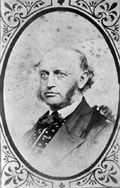 John Baird, draper, architect and benefactor, was born in 1813, at Lugar Street, Cumnock, where his father David kept the Tup Inn. Previously David Baird had tenanted the farm at Longmore on Logan Estate. When David Baird married Jean Vallance they ran the Tup Inn which became a popular establishment in the town.
John Baird, draper, architect and benefactor, was born in 1813, at Lugar Street, Cumnock, where his father David kept the Tup Inn. Previously David Baird had tenanted the farm at Longmore on Logan Estate. When David Baird married Jean Vallance they ran the Tup Inn which became a popular establishment in the town.
When his father died, John Baird inherited a considerable amount of property in Lugar Street. The Lugar Street property consisted of a row of thatched houses which John Baird pulled down in the 1860`s and replaced with a handsome building containing business premises from where he operated his drapery shop (later to become James Livingstone`s grocery business).
John was the only son and after leaving school he was sent to learn the joinery trade and soon became an able workman. During this period of his life he read extensively, particularly science and art. At an early age he developed an aptitude for drawing which continued as a young man. He would walk regularly to Catrine to get instructions from one of the draughtsman in Cotton Mill. He studied chiefly mechanical drawing and examples of this work survive in the museum collection. Life as a working joiner did not really suit John Baird, so he decided to try something new and turned his attention to the drapery trade. When John Baird retired he disposed of his drapery business to John Goldie who continued the trade.
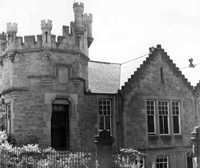 John Baird died on 27th July, 1888 in his 76th year and is buried at the old cemetery. In his will, John Baird made a bequest that his estate be used to provide a public building in Cumnock which would contain a museum, recreation and reading rooms on the land owned by him in Lugar Street, known as Baird`s Place. The Baird Institute was opened on March 2nd, 1891, by Mrs. Brakenridge, wife of the Town Clerk. The building was designed by Mr. Ingram of Kilmarnock, the son of John Baird`s early instructor in engineering drawing. The building is in the Scottish Baronial style of architecture standing about 30 feet back from Lugar Street. It is constructed from pink sandstone quarried at Auchinleck.
John Baird died on 27th July, 1888 in his 76th year and is buried at the old cemetery. In his will, John Baird made a bequest that his estate be used to provide a public building in Cumnock which would contain a museum, recreation and reading rooms on the land owned by him in Lugar Street, known as Baird`s Place. The Baird Institute was opened on March 2nd, 1891, by Mrs. Brakenridge, wife of the Town Clerk. The building was designed by Mr. Ingram of Kilmarnock, the son of John Baird`s early instructor in engineering drawing. The building is in the Scottish Baronial style of architecture standing about 30 feet back from Lugar Street. It is constructed from pink sandstone quarried at Auchinleck.
David McCowan, insurance broker and philanthropist.
Cumnock Express May 1908 The Late David McCowan, LL.D.
Nowhere will the death of this large-hearted philanthropist (which took place on Sabbath last) be more lamented than in Cumnock, his native parish, although for more than sixty years Glasgow has been the home of his adoption, of his business activities, and of his unnumbered philanthropic deeds. Never robust, though wiry and agile, Mr. McCowan had for years been in a very precarious state of health, although he nevertheless lived to pass by fully a couple of years the fourscore.
Mr. McCowan was born at the farm house of Caponacre, about half a mile south of the town of Cumnock, in the notable year of 1826, long -- and by a few still -- remembered as "the drouthy year", or as "the year of the short corn". His father, besides cultivating the farm, for years acted as a carrier between Ayr and Dumfries. A man of energy and enterprise, he was able to put two of his sons into much larger farms on the Dumfries Estate. Like the others, David, the subject of our sketch, was partly educated at the parochial school and partly at one of the several adventure schools which had been set up in the town, completing his excellent commercial education by a three years` course at the even then famous Ayr Academy. At the age of fifteen, sixty-seven years ago, Mr. McCowan entered a writer`s office in the great commercial city of the west, where we need not follow his business course further than to say that he did not follow the law, but turned aside to, and entered upon that of Insurance Broker and Underwriter, the business of which he was first a partner and then the head, prospering greatly in their hands; and for half a century, Mr. McCowan`s name has been synonymous for all that was liberal in action and lofty and pure in motive. Outside his business he was ever on the alert how he might best benefit his fellowman, and if ever a man "did good by stealth, and blushed to find it fame", it was Mr. McCowan, for his great aim was to do the action for the action`s sake, and not that the breath of popular applause might waft his name and his good deeds abroad. But it is well known that his donations to the great public charities and other excellent institutions of the city were princely and that his more private gifts were as frequent as they were unstinted and frankly given. Verily, like the patriarch Job of old, Mr. McCowan might in truth and verity have said -- "When the ear heard me, then it blessed me; and when the eye saw me, then it gave witness to me: because I delivered the poor that cried, and him that had none to help him. The blessing of him that was ready to perish came upon me, and I caused the widow`s heart to sing for joy. I was eyes to the blind, and feet was I to the lame. I was a father to the poor, and the cause which I knew not I searched out."
Many were the honours which the city which he had benefited so much wished to heap upon him, but these he all refused. Until at last, he was induced to receive that of Doctor of Laws from the University of the city in which he had long dwelt, but the honour came too late in life to be enjoyed for almost any length of time; for the curtain was just about to drop on all sublunary things when the honour came and which we believe, he accepted more as a compliment to those who proffered it than out of any desire upon his part, so great was his modesty and so beautified his humility. Latterly Mr. McCowan visited the place and parish of his birth but seldom. The last occasion -- that we know of -- was a good many years ago, when he was here performing some public function in the town. When it was over he asked the writer of this notice to accompany him out to the place of his birth and the home of his youth. We did so, and can well remember with what intense earnestness and in silence he stood and gazed upon the altered home of his ancestors, his lips quivering with emotion, and only saying with a shake of the head as he turned his back upon the scene, "Ay the burnie still is here"; and in a deeply contemplative mood we walked back together to the town, we refraining to break in upon his heart-full reverie.
Mr. McCowan was married to a daughter of the late Rev. John Walker, of the Secession (formerly the Burghal) Church of Mauchline, who pre-deceased him a period of some seventeen years, and it showed the kindness of his nature, that in that church (now the United Free) but bearing the name of "The Walker Church," Mr. McCowan took a deep interest to the last. But why say more. Mr. McCowan was not only a model man of the world, but a sincere Christian, and we only add regarding him: -- "Thy race is run, thy warfare`s o`er Enter thy Master`s joy."
Cumnock Chronicle : 1st May 1908 David McCowan
Elsewhere in today’s issue there appears a lengthened notice of the life and work of the late Mr. David McCowan, LL. D. A considerable portion of that notice is taken from one which was given in the Glasgow Herald of last Monday – one which bore ample internal evidence that it was from the sympathetic pen of a writer who knew well and esteemed much, his subject. From it we can form an accurate idea of the more outstanding works of beneficence in which Mr. McCowan so actively interested himself while a citizen of Glasgow. From it also we get a delightful glimpse of boyhood days in our own town, as well as a fine appreciation of a noble character. Altogether it was an article worthy the personality it sought to honour. For David McCowan was no ordinary man. In his own sphere he was great, but an even higher attribute than greatness can be applied to him – he was good. It is our pride to think and to say that he was essentially a Cumnock man.
Descended from farming stock – his great grandfather, his grandfather and his father being all farmers in this parish – he inherited from them many of the best traits in the Scottish character. On the distaff side he was equally fortunate in his descent – his mother being a singularly fine type of the Scottish matron. For her he had the deepest filial love, as we gather from a letter written to him in 1870 by Dr. ROBERTSON of Irvine – the poet-preacher – when she was called to her rest. It is a long look back to 1826, when Mr. McCowan was born, but never once in all the intervening years did he forget, or lose interest in, his homeland.
His schooldays seem to have made an indelible dent in his memory, and in these days of railways and season tickets, and of County Council inducements for pupils to attend scholastic institutions at a distance, it is interesting to recall that Mr. McCowan, as yet scarcely in his teens, tramped the long sixteen miles between Cumnock and Ayr twice a week when he was attending the Academy of the county town. He walked home at every weekend, and set out bright and early every Monday morning in order to reach Ayr in good time for the opening of his classes. On one occasion he brought home with him two poplar slips, and, with boyish pride, planted them with his own hand in front of Caponacre; today they are two of the finest trees in all the country round. Of his many acts of generosity to Cumnock and her people we do not pause to enlarge – it will suffice to say that they were as numerous as they were unostentatious. To give point to this, however, we must add that within the past year he sent a cheque for £100 to the Nursing Association, besides sending handsome donations to such commendable institutions as the Flower Show and Bare-feet Fund. Now that he has entered upon his rest and reward it can be said in all sincerity that his life and work were stamped by the grandeur of his personal character. Transparent sincerity and earnestness were outstanding traits in that character. His ambition was to do good, and his life reflects the joy which comes from doing it. The natural bent of his mind and disposition was to do things quietly, but to do them well, and it will be a long time before the memory of such a man fades into the light of common day. Indeed, it might be asked if such a man can be taken from us without our blessing and revering his memory, without our holding him up as a bright example and encouragement to others to follow in his steps so far as in them lies.
Cumnock Chronicle : 1st May 1908
The Late Mr. David McCowan, LL.D. Cumnock’s Worthiest Son
It is with feelings of profound regret that we today record the passing of Mr. David McCowan, LL.D, which took place at his home, 7 Lynedoch Crescent, Glasgow, on Sunday last {26th April}. For a long time Mr. McCowan, who was in his eighty-third year, had been in indifferent health. Against it he battled with rare courage, consistency and bravery, and never once did he allow his own physical weakness to stand between him and his duties, very many of which were self imposed. Mr. McCowan belonged to a rare class of men of whom the world holds but few. To a splendid faculty for business he joined a large-hearted generosity, which won for him distinction not only in the commercial, but in the philanthropic circles of the city. If we were asked to describe him in a word we would say that he was a philanthropist and would use that word not in any narrow or limited sense, but in its noblest and broadest meaning. Mr. McCowan was a rich man, and he acquired his wealth by diligence and by business ability. That he derived great pleasure in its acquirement may not be doubted, but he had even greater pleasure in giving expression to the philanthropic impulses which were forever actuating his heart and mind. Of him it might truly be said that although one of the most modest and most unobtrusive of men, yet he had at all times the courage to avow his sentiments with a tongue which was really the herald of his heart. Truth and honour were his consistent guides and rule of life, and a kindly benevolence had its home in his bosom.
Mr. McCowan was born at Caponacre in this parish in 1826, and was the second youngest of a family of nine sons and 2 daughters, all of whom he outlived. His father {William} was an excellent type of man, and one who was possessed of an intelligence much above the average in his walk of life, which was that of a small farmer. He had an accurate conception of the value of education, and he saw to it that all his children received as much learning as the times could afford. His son David was first sent to the parish school, which was at that time kept by James Campbell, but whose methods did not approve themselves to the head of the McCowan family. The boy was taken from Campbell and sent to an adventure school in the town, where he remained until he was eleven years of age. Then came an important turning in his life in that he was sent to Ayr Academy, there to pursue his studies. He attended this Academy for three years, and that he ever cherished a kindly remembrance for it was evidenced in after years by his generosity towards it. The McCowan gold medal -- the chief prize of the institution -- was his gift, and it was but one of several ways in which he showed his solicitude for the welfare of the place where he had himself derived so much benefit. Like many another youth brought up in the country districts, Mr. McCowan early turned his thoughts in the direction of Glasgow.
He was but a lad of fifteen when he left the kindly shelter of his home at Caponacre to merge himself in the even then great city on the Clyde. He began his business career in a lawyer’s office. We are not sure that he took kindly to that profession, for in a few months we find him installed in the office of the late Mr. William EUING, marine insurance broker and underwriter – an appointment he received by replying to an advertisement. Mr. Euing seems to have been a very remarkable man – a man who took a keen personal interest in the spiritual, as well as the temporal, well-being of his employees. Mr. McCowan used to say that he had learned more of what real Christianity meant from the daily practice of Mr. Euing, than from all the exhortations he had ever heard from the pulpit. Could a finer tribute be paid to an employer by an employee?
Mr. McCowan remained with this firm for four years, when he began business on his own account as a stockbroker. He had as partner a Mr. Campbell, but at the end of the first year the partnership came to a termination. Mr. McCowan had arranged for his older brother Robert joining with him, but just at that time Mr. Euing sent for his former clerk and offered him £160 a year of salary to return. The salary in itself was no inducement, for Mr. McCowan had realised his own possibilities in the year he had been in business. What would be an inducement to return would be an undertaking that a permanent position in the firm be assured him. Mr. Euing, however, would not come under any agreement, but it would seem as if some kind of promise was made that satisfied Mr. McCowan, for he went back to the office and from that date received a definite share in the business. Time passed and some ten years later the name of the firm was changed to William Euing & Co. Mr. Euing died in 1874, when Mr. William Birrell became the head of the firm and remained so until he died in 1882, after which date Mr. McCowan became its head.
It would be impossible with the space at our disposal to enumerate the many “honorary” appointments held by Mr. McCowan. All of these appointments entailed much work and thought, but it was a characteristic of the man that he did not spare himself in the discharge of the duties which they incurred. On quite a number of occasions his friends desired to present him with his portrait in oils, but he would not hear of it. All the same they did make him several valuable gifts, but they were not accompanied by any public functions. Noteworthy gifts took the form of two illuminated addresses – one enclosed in a beautiful silver casket and the other handsomely mounted – and a magnificent epergne. These gifts had to be pressed upon him. As to his public work we cannot do better than quote the following from a lengthened obituary notice which appeared in the Glasgow Herald of last Monday :-
Those who knew Mr. McCowan with any degree of intimacy will have no difficulty in accounting for the respect for his character and the regard for his opinion which he inspired wherever he went and worked with other men. Whether it was in the underwriter’s room, or the Business Committee of the Merchant’s House, the Kirk Session, the Home or Foreign Mission Board of the Church, the Committee of Synod or Assembly, the board of directors of the Royal Infirmary, the Savings Bank, or the Old Men’s House or the Sailor’s Home, the Ferguson Trustees, or the managers of the bursary scheme of education, there were exhibited the same quiet dignity of bearing, the same modesty in giving counsel, respect for the opinions of others, readiness to accept useful proposals from whatever quarter, determination to hear all that could be said on all sides of a question before making up his mind on its merits, perfect willingness to take a second place, or, in fact, no place at all, on a committee so long as work was well and expeditiously done, impatience of irrelevant matter, regard for men who spoke seldom or little but did much.
He took an intelligent interest in the important Church questions, which were approaching their crisis when he came to Glasgow as a young man. His sympathies were all with the Non-Intrusion party of the church. After the Disruption he was for a time a member of the congregation of Dr. Robert Buchanan, for whose statesman-like abilities he had to the last a well-founded admiration. He ultimately found his way into the United Presbyterian Church, of which he became a most devoted member and liberal supporter, first attaching himself to Greyfriars and afterwards to Claremont Church, of which he was elected elder in 1859, and in connection with which he most conscientiously performed the duties of eldership to the last. The Augmentation Fund was greatly the better at once of his contributions and his administrative counsel, and there is no doubt that he did more than any individual to raise the Endowment Fund of £40,000 that put the theological training of the United Presbyterian ministry on the level of that of other Presbyterian Churches in Scotland.
None but very intimate friends knew the amount of mental and physical exertion he expended in these efforts for the good of the Church. His work was, however, without doubt highly appreciated. On more than one occasion he was voted the public thanks of the Synod for his labours in connection with the various Church schemes. For many years he was chairman of the Home Mission Board, which showed its appreciation of his efforts in the same way as the underwriters had done – against the will of the recipient, and entirely without publicity. He was the only surviving lay member of the committee that worked for the Union of the Churches from 1863-1873, and again took part in the work of the committee which finally carried the Union in 1900. At the Union of the Churches in 1900 he was appointed one of the trustees of the United Church, and also to the joint convenorship of the Sustentation Fund Committee with the late Dr. Ross Taylor.
In the year 1886 he succeeded the late Mr. John McClure of the firm of Messrs McClure, Naismith and Brodie, as honorary treasurer of the Royal Infirmary, an institution which assuredly had never a more loyal or devoted supporter. He threw himself with great zest into the reconstruction scheme, and he much regretted some obstacles to the progress of that great undertaking thrown in the way. All the same he worked assiduously at the new scheme when it was fairly set agoing, and by his own liberal contributions, as well as by his judicious applications to others, helped forward the scheme to its present position of comparative success.
He had his own way of raising money for religious and philanthropic objects. He had only a limited faith in the public meeting with its appeals, addressed to the public in general and to nobody in particular, and just as little in official circulars. He preferred to sit in his office observing the course of trade, watching who could not fail to be enjoying successful years and making money, and to these he made a personal appeal, pointing out the necessity of the scheme, and supporting his appeal by his own example. It could be shown in the case of the reconstruction of the Royal Infirmary that his method met with a large measure of success. In the general administration of the hospital he was always as supporter of liberal and generous views on all questions, whether touching the admission of women to the management or affecting the patients or the medical staff.
In fact, to Mr. McCowan might be applied the description of the former treasurer and governor of St. Bartholemew’s in London, with a feeling of satisfaction that such treasurers and governors are not confined to London or Glasgow. The words are those of the eminent pathologist Sir James Paget. They are taken from his autobiography, and are applied to Mr. James Bentley, the treasurer of St. Bartholomew’s in his day. “He was truly an admirable man, an example of that admirable class, the rich merchants given to good works; men who make money with great care, and give it away with as great a liberality; men who are exact and orderly in business; sometimes even exacting, when those they deal with are not needy, winning money as keenly as others would win games at cards, counting their money as the fairest estimate of their success in a difficult and honest competition: but, once counted, giving it freely, and with it giving their time and strong will and knowledge to the management of great charities”.
He was for many years chairman of the governors of the Old men’s and Old Women’s Home in Rottenrow – a charity to which he cheerfully devoted time and sympathetic attention. No man was ever readier to acknowledge the merits and help of fellow-directors, and in connection with this charity in particular he has been heard to describe in very warm terms the help of Mr. Thomas Mason in giving freely his valuable professional skill towards the recent extension and improvement of the buildings that went far to increase the comfort of the old men and women. Our University performs a useful function in occasionally making public appreciation of a distinguished civic career, and although in this instance probably no one was more surprised than the recipient of the honour, wide satisfaction attended the action of the University in recently conferring upon Mr. McCowan the honorary degree of Doctor of Laws. Mr. McCowan was too ill to attend the graduation ceremony on Wednesday last, and the degree was conferred in absentia. His wife, who was a daughter of the Rev. John Walker of Mauchline, died in 1891. No one can express a better wish for the city than that it may have a succession of public men of the strong brain, the generous heart, the public spirit, and the sterling integrity of David McCowan.
Family information – David was born in Cumnock on 17th February 1826 – the son of William McCowan and Jane Hart. He married Margaret Walker in Barony, Lanarkshire on 25th February 1852. He died on 26th April 1908 at 7 Lynedoch Crescent, Glasgow.
Sir David McCowan, insurance broker and philanthropist
Ayr Advertiser May 20th 1937 The Late Sir David McCowan Native of Ayr
The death took place on Saturday of Sir David McCowan, Bt., D. L., who for many years was widely known in commercial, civic and social circles in the West of Scotland.
Sir David was senior partner of Messrs William Euing and Co., marine insurance brokers, a firm with a history of over a century, and his other commercial activities included directorships of George Outram and Co., Ltd., the Burmah Oil Company, Ltd., the Irrawaddy Flotilla Company, Ltd., several Scottish investment trusts, and the Royal Exchange, Glasgow, of which he was chairman. He was also until his retirement two years ago a director of the Clydesdale Bank.
In 1889 he married Gertrude Margaret, daughter of David S. Cargil, Glasgow, and sister of Sir John T. Cargill, Bt. Along with Lady McCowan, who in 1923 had conferred upon her the C.B.E for her manifold public and benevolent works, Sir David took a conspicuous part in the innumerable aspects of social service and philanthropic effort.
Sir David received the honour of knighthood in 1928, and he became a Baronet in 1934, taking the title of Sir David McCowan, Bt., of Dalwhat, county of Dumfries, which had belonged to his mother and passed to him. These honours were conferred on him in recognition of his many public services
Ayr Associations
Sir David was born in Ayr in 1860. He was the son of Mr Hew McCowan, agent of the Royal Bank of Scotland in Ayr, and of Mrs Joan McCall or McCowan, of Dalwhat, Glencairn, Dumfries-shire. He succeeded to the major portion of the estate of his uncle, Mr David McCowan, who was born at Caponacre, Old Cumnock, and died about 34 years ago. The uncle used to ride from Cumnock to Ayr to attend the Academy, and his association with the school was marked by the endowment of the David McCowan prizes for English and art, which are still amongst the most valuable and coveted prizes of the school. Sir David’s uncle was treasurer of the Royal Infirmary, Glasgow. It was Sir David’s greatest desire to follow worthily in his uncle’s footsteps, to take “take up the song where he left off the strain”, and the Royal Infirmary had no more generous supporter.
For some years Sir David and Lady McCowan resided at Kirkmichael House, which he rented on lease. He was anxious to reside in his native county, and at one time was prepared to purchase Kirkmichael estate. He loved Kirkmichael and was beloved in the district, being a most generous supporter of all local appeals. On the termination of his lease of Kirkmichael he rented Monzie Castle, Crieff, Perthshire, where Lady McCowan and he entertained largely.
Sir David was predeceased by Lady McCowan in 1935, and is survived by his younger son, Mr David J. C. McCowan and his daughter, Mrs Alexander Osborne Bonnar, Edinburgh. The elder son, Mr Hew McCowan, was killed in action at Gallipoli in June 1915, while he served with the Scottish Rifles. As a memorial of her elder son Lady McCowan established a club for working girls in Maryhill, the name of the institution being the Hew McCowan Club.
Family information – David was born on 8th December 1860 in Ayr – the son of Hew McCowan (banker) and Joanna McCall. He married Gertrude Margaret Cargill in 1889. David’s father Hew was born c.1815 in Cumnock to William McCowan and Jane Hart.
Latta Crescent in Cumnock was named after Sir John Latta, shipowner, merchant and benefactor, who was born on 9 May 1867 in Old Cumnock, the son of William Latta and Margaret Allan. He married Ada May Short in 1896. Sir John Latta, 1st Bart, of Portman Square, London, was knighted on 9 February 1920. Sir John was born outside Cumnock at Darmalloch Farm, and gained his wealth through his shipping company. At his death on 5 December 1946, Sir John was Chairman of Lawther, Latta & Co. shipowners and merchants. The Title became Extinct with his death, as his son Cecil did not survive him.
The following obituary appeared in the Cumnock Chronicle on 13th December 1946
The Late Sir John Latta, BT, Cumnock’s benefactor
“Sir John Latta, the Scottish shipowner, died in London yesterday at the age of 79. Sir John, who was the chairman of Lawther, Latta & Co. Ltd. first went into the shipping industry in 1883 and soon afterwards introduced steamships into the nitrate trade. As chairman of the Nitrate Producers’ Steamship Company, he managed his own fleet. He was an individualist, always deplored State concern with merchants shipping, and was a strong believer in free trade”
The above brief notice in Saturday’s “Glasgow Herald” was the first intimation local folks generally had of the passing of one of Cumnock’s most distinguished sons.
Sir John was born at Darmalloch Farm and had his early schooling in Cumnock before proceeding to Ayr Academy and then to the Greenock firm of Craig and Scott. We hope to refer more fully to his subsequent career in the commercial world of the metropolis in our next issue. At this moment, we recall with grateful thanks his many benefactions to our town and district. His personal identity with the Academy Dux Medal and Sports Championship awards each year; his handsome contribution annually to the funds of the Old Folk’s Parties in Cumnock and other nearby areas; and his noble encouragement to the Cumnock War Work Party when they first set out in earnest to make a really outstanding effort, are all remembered with gratitude – and these are but a few of the media which Sir John selected as an avenue for his public-spirited generosity. To his wife and family, Sir Andrew Latta, K.B.E., and Sir John’s other brothers and sisters, we extend the community’s sincere sympathy.
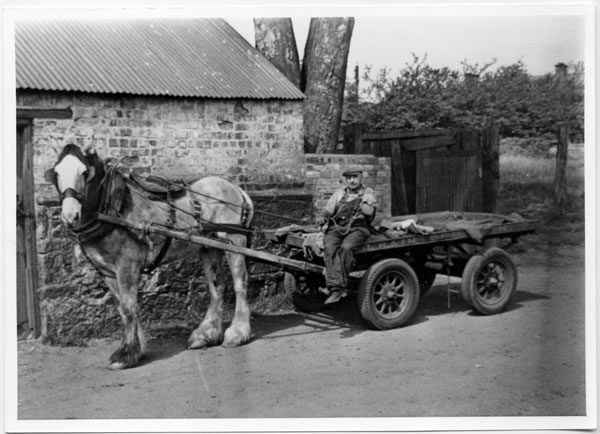
Joe and his horse Bobby were well known characters in Cumnock. His grandson Peter E Smith posted this newspaper article about his grandfather Joe.
